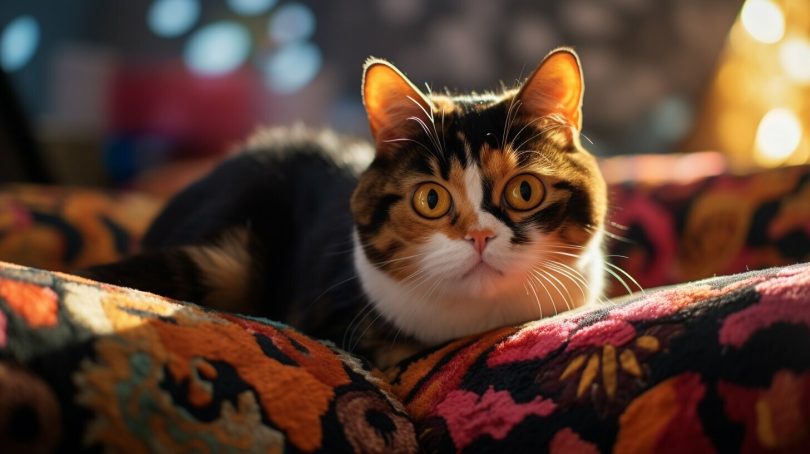Welcome to the world of the exotic shorthair tortoiseshell cat, a truly one-of-a-kind feline breed. These cats are closely related to Persians but have shorter coats, making them a popular choice for those who adore the Persian look without the high grooming maintenance. With their distinctive features and loving personalities, exotic shorthair tortoiseshell cats are a remarkable addition to any home.
Key Takeaways:
- Exotic Shorthair cats are closely related to Persians but have shorter coats.
- They have a square frame, broad rounded heads, and distinct flattened noses.
- Their coats come in a variety of colors and patterns, including the striking tortoiseshell pattern.
- Exotic Shorthairs are known for their affectionate, gentle, and loyal nature.
- Regular grooming, a balanced diet, and exercise are essential for their well-being.
Unraveling the History of Exotic Shorthair Cats
Let’s take a journey back in time to uncover the fascinating history of the exotic shorthair breed. These unique felines, closely related to Persians, have captured the hearts of cat enthusiasts worldwide with their distinctive features and gentle personalities.
The story begins in the 1960s when breeders sought to create a breed that combined the luxurious coat of the Persian with a shorter, more manageable length. By crossing American Shorthairs with Persians, breeders achieved their goal and the exotic shorthair breed was born.
The breed gained recognition as a distinct breed in 1966 and quickly gained popularity for its adorable appearance and easy-going nature. With their medium-sized bodies, square frames, broad rounded heads, and distinct flattened noses, they exude charm and sophistication.
Exotic shorthair cats come in a wide array of colors and patterns, including the stunning tortoiseshell coat. Their short, soft, and dense fur is easy to groom, requiring regular brushing and cleaning of their ears, teeth, and faces to maintain their pristine appearance.
| Characteristics | Description |
|---|---|
| Physical Traits | Medium-sized cats with a square frame, broad rounded heads, and distinct flattened noses. |
| Coat | Short, soft, and dense; available in various colors and patterns, including the exquisite tortoiseshell coat. |
| Temperament | Affectionate, gentle, and deeply attached to their owners; known for their loyalty and calm nature. |
These adorable felines have an average lifespan of eight to 11 years. However, it’s essential to be aware of potential health issues associated with their brachycephalic features. Regular veterinary check-ups and specialized care can help ensure their overall well-being.
It’s worth mentioning that exotic shorthair cats can also have longhaired kittens. While some organizations recognize them as a separate breed called exotic longhairs, they share the same delightful characteristics and low-maintenance coat as their shorthair counterparts.
The history of exotic shorthair cats is a testament to the ingenuity of breeders and the enduring appeal of these enchanting felines. Whether it’s their captivating charm, gentle temperament, or easy-care coat, exotic shorthairs have firmly established themselves as beloved companions in households around the world.
The Distinct Features of Exotic Shorthair Tortoiseshells
Exotic shorthair tortoiseshells stand out with their striking coat patterns and distinctive physical features. These charming felines boast a unique combination of colors, usually consisting of a mix of black, orange, and cream in a swirling pattern. Each individual cat has its own individual coat design, making them truly one-of-a-kind.
Not only are their coat patterns eye-catching, but exotic shorthair tortoiseshells also have notable physical features. With their medium-sized, stocky bodies and round faces, they bear a resemblance to their Persian relatives. However, what sets them apart is the endearing flatness of their noses, giving them a distinct look that is both adorable and unmistakable.
Besides their captivating appearance, exotic shorthair tortoiseshells have a gentle and affectionate temperament that adds to their appeal. They are known for their sweet and loving nature, often forming strong bonds with their owners. These cats enjoy being petted and snuggled, and they thrive on human companionship.
| Distinctive Features of Exotic Shorthair Tortoiseshells |
|---|
| Unique coat patterns with a mix of black, orange, and cream |
| Medium-sized bodies with a stocky build |
| Round faces and distinctive flattened noses |
| Gentle and affectionate temperament |
When considering adding an exotic shorthair tortoiseshell to your family, it’s important to note that they require regular grooming. Their short, dense coats require brushing to prevent matting and maintain their softness. Additionally, keeping their ears, teeth, and faces clean is essential for their overall well-being.
Providing a balanced diet and regular exercise is crucial for the health and happiness of exotic shorthair tortoiseshells. They benefit from a high-quality cat food that meets their nutritional needs. Maintaining an active lifestyle through play and interactive toys will help keep them mentally stimulated and physically fit.
Overall, exotic shorthair tortoiseshells are captivating companions with their gorgeous coat patterns, unique physical features, and affectionate personalities. These delightful felines are sure to bring joy and love to any home lucky enough to welcome them.
In summary, exotic shorthair tortoiseshells are known for their distinctive coat patterns, including a mix of black, orange, and cream. They have medium-sized bodies, round faces, and flattened noses that give them an adorable and recognizable appearance. With their gentle and affectionate temperament, they form strong bonds with their owners. Regular grooming, a balanced diet, and exercise are essential for their well-being. These unique cats are a wonderful addition to any family looking for a charming and loving companion.
Getting to Know the Exotic Shorthair Tortoiseshell Personality
Discover the charming and lovable nature of the exotic shorthair tortoiseshell as we delve into their personality. These unique felines possess a delightful combination of traits that make them a joy to have as companions.
The exotic shorthair tortoiseshell is known for its sweet and gentle temperament. They are incredibly affectionate and form strong bonds with their owners. Whether it’s curling up on your lap or following you around the house, they always seek your attention and love to be in your company.
These cats are calm, patient, and adaptable. They can easily adjust to different environments and are often comfortable in apartment living. With their easy-going nature, they get along well with other pets and children, making them a perfect addition to any household.
Exotic shorthair tortoiseshells are also known for their low-maintenance personalities. They require minimal grooming compared to their longhaired counterparts. Regular brushing and cleaning of their ears, teeth, and faces are usually sufficient to keep them looking their best. Their friendly and laid-back demeanor makes them a pleasure to care for and enjoy their company for years to come.
| Traits | Description |
|---|---|
| Affectionate | Exotic shorthair tortoiseshells form strong bonds with their owners and seek their attention. |
| Calm | They have a calm and patient nature, making them adaptable to various living environments. |
| Low-maintenance | These cats require minimal grooming, making it easier to care for them on a daily basis. |
“The exotic shorthair tortoiseshell’s gentle and affectionate personality is what drew me to this breed. They are the perfect companion for those seeking a calm and loving feline friend.” – Exotic Shorthair Owner
Caring for Your Exotic Shorthair Tortoiseshell
Learn how to keep your exotic shorthair tortoiseshell looking and feeling their best with our grooming guide. Exotic Shorthair cats are known for their beautiful and low-maintenance coats, but regular grooming is still essential to keep them healthy and happy. Here are some tips to help you care for your exotic shorthair tortoiseshell:
- Brushing: Exotic Shorthairs have dense coats that can get easily tangled or matted. Regular brushing is key to prevent these issues and keep their fur soft and shiny. Use a soft brush or comb and gently work through their fur, paying extra attention to areas like the chest and belly.
- Cleaning the Face: Due to their flat noses, exotic shorthair tortoiseshells are prone to tear stains and dirt buildup around their eyes and faces. Use a damp cloth or pet-safe wipes to gently clean these areas, being careful not to get water in their ears.
- Ear Care: Exotic Shorthairs have small ears that can trap dirt and wax. Regularly check and clean their ears using a veterinarian-recommended ear cleaner and cotton balls. Be gentle and avoid inserting anything deep into their ear canal.
- Oral Hygiene: Like all cats, exotic shorthair tortoiseshells need proper dental care. Brush their teeth regularly with a cat-specific toothbrush and toothpaste. You can also provide dental treats or toys to help keep their teeth clean.
Recommended Products for Grooming Your Exotic Shorthair Tortoiseshell
“I’ve found that using a soft bristle brush and pet-safe wipes works wonders for keeping my exotic shorthair tortoiseshell’s coat and face clean. It’s important to use gentle products and establish a regular grooming routine to ensure their well-being.”
| Product | Description |
|---|---|
| Soft Bristle Brush | Gentle brush to prevent matting and tangles |
| Pet-Safe Wipes | For cleaning the face and removing tear stains |
| Veterinarian-Recommended Ear Cleaner | To maintain clean and healthy ears |
| Cat-Specific Toothbrush and Toothpaste | For regular oral hygiene and dental care |
By following these grooming practices, you can help your exotic shorthair tortoiseshell look their best and maintain their overall health. Remember to approach grooming sessions with patience and provide treats or positive reinforcement to make the experience more enjoyable for your furry friend. Regular grooming not only keeps their coat and skin in excellent condition but also strengthens the bond between you and your exotic shorthair tortoiseshell.
The Health Considerations of Exotic Shorthair Tortoiseshells
It’s important to be aware of the health considerations when considering bringing an exotic shorthair tortoiseshell into your home. Like many brachycephalic breeds, exotic shorthairs can be more prone to certain health issues due to their unique facial structure. One common concern is the risk of developing jaw deformities, which can affect their ability to eat and may require corrective surgery. Additionally, their flattened noses can lead to breathing difficulties, so it’s crucial to ensure they have proper airflow and ventilation.
Exotic shorthair tortoiseshells may also be prone to eye problems, such as excessive tearing or cherry eye, which is the prolapse of the gland of the third eyelid. Regular eye checks and gentle cleaning can help prevent these issues from worsening. Dental hygiene is another area to pay attention to, as their flat faces can make them more susceptible to dental disease. Daily brushing and regular dental check-ups are recommended to maintain their oral health.
To ensure the well-being of your exotic shorthair tortoiseshell, regular veterinary check-ups are essential. These check-ups can help detect any potential health issues early on and provide the necessary treatments. It’s also crucial to choose a reputable breeder who prioritizes the health and welfare of their cats. Reputable breeders will conduct health screenings on their breeding cats and provide you with health certificates for the kittens. By adopting from responsible breeders, you can minimize the risk of inheriting genetic health problems.
Health Considerations Summary:
- Watch for possible jaw deformities and breathing difficulties due to their unique facial structure.
- Keep an eye on their eyes to prevent issues like excessive tearing or cherry eye.
- Maintain good dental hygiene through regular brushing and dental check-ups.
- Have regular veterinary check-ups to detect and address any health issues.
- Choose a reputable breeder who prioritizes the health and welfare of their cats.
| Common Health Concerns | Preventive Measures |
|---|---|
| Jaw Deformities | Regular veterinary check-ups and potential corrective surgery |
| Breathing Difficulties | Ensuring proper airflow and ventilation |
| Eye Problems | Regular eye checks and gentle cleaning |
| Dental Disease | Daily brushing and regular dental check-ups |
Feeding and Exercise for Exotic Shorthair Tortoiseshells
Discover the key elements of a balanced diet and exercise regimen for your exotic shorthair tortoiseshell companion. Providing your cat with proper nutrition and regular physical activity is essential for maintaining their overall health and well-being.
When it comes to feeding your exotic shorthair tortoiseshell, it is important to choose a high-quality cat food that meets their nutritional needs. Look for options that are specifically formulated for adult cats and provide a balanced mix of protein, fats, and carbohydrates. Avoid foods with excessive fillers or artificial ingredients that may cause digestive issues or allergies.
Additionally, consider portion control to prevent overfeeding. Follow the recommended feeding guidelines provided by the manufacturer based on your cat’s weight and activity level. It is also crucial to provide fresh water at all times to keep your cat hydrated.
In terms of exercise, exotic shorthair tortoiseshells benefit from regular playtime and physical activity. Engage your cat in interactive play sessions using toys that encourage them to chase, pounce, and jump. This not only provides exercise but also stimulates their natural hunting instincts and mental agility.
Creating a safe and enriching environment for your cat is also important. Provide scratching posts, climbing structures, and toys that keep them engaged and mentally stimulated. Consider rotating their toys to keep them interested and prevent boredom. Furthermore, ensure that your exotic shorthair tortoiseshell has access to a space where they can explore and engage in natural behaviors.
Sample Exercise Routine:
| Activity | Frequency | Duration |
|---|---|---|
| Interactive Playtime | Daily | 15-20 minutes |
| Access to Climbing Structures | Daily | N/A |
| Exploration and Enrichment Time | Daily | N/A |
Remember to consult with your veterinarian regarding the specific dietary and exercise needs of your exotic shorthair tortoiseshell. They can provide tailored recommendations based on your cat’s age, weight, and any underlying health conditions.
Longhaired Exotic Shorthair Tortoiseshells: A Variant Worth Mentioning
Did you know that exotic shorthair tortoiseshells can occasionally have longhaired kittens? Let’s explore this interesting variation. While the exotic shorthair breed is known for its short, dense coat, there is a unique subset within the breed that boasts luxurious longhair.
The longhaired exotic shorthair tortoiseshell cats possess the same adorable flattened face, round eyes, and gentle expression as their shorthaired counterparts. However, their soft, flowing locks add an extra touch of elegance to their already captivating appearance. This variation in coat length adds another layer of charm to an already alluring breed.
Just like their shorthaired counterparts, longhaired exotic shorthair tortoiseshells are known for their calm and loyal nature. They form strong bonds with their owners and often enjoy spending quality time, whether it’s cuddling on the couch or playing with interactive toys. Their low-maintenance coat requires regular brushing to prevent tangling and matting, which can help keep their fur healthy and shiny.
Longhaired Exotic Shorthair Tortoiseshell Information
If you are thinking about adding a longhaired exotic shorthair tortoiseshell to your family, it’s important to note that these cats may require more grooming than their shorthaired counterparts. Regular brushing helps prevent the formation of knots and tangles in their longer fur. Additionally, it’s essential to keep their ears clean, teeth brushed, and faces wiped to maintain their overall hygiene.
Longhaired exotic shorthair tortoiseshells are a fascinating variant within the breed. Their unique coat length adds an extra layer of beauty to an already captivating breed. Whether you prefer the shorthaired or longhaired variety, one thing is for sure – exotic shorthair tortoiseshells make wonderful companions with their affectionate nature and loyalty towards their owners.
| Traits | Description |
|---|---|
| Coat Length | Long |
| Temperament | Calmand loyal |
| Grooming Needs | Regular brushing to prevent matting |
| Hygiene | Ears, teeth, and face cleaning |
The Bond Between Exotic Shorthair Tortoiseshells and Their Owners
Experience the deep connection that forms between an exotic shorthair tortoiseshell and their devoted human companion. These unique felines have a special ability to create strong emotional bonds with their owners, making them cherished members of the family.
Exotic Shorthair tortoiseshells are known for their affectionate and gentle nature. They thrive on human companionship and seek out opportunities for cuddles and snuggles. Their sweet and loving personalities make them the perfect companion for individuals or families looking for a loyal pet.
One of the remarkable qualities of exotic shorthair tortoiseshells is their unwavering loyalty. They will follow their owners around the house, always wanting to be close and be part of their lives. Whether it’s sitting on your lap while you work or curling up next to you on the couch, they will always be by your side, providing comfort and companionship.
Furthermore, these cats are highly intuitive and sensitive to their owners’ emotions. They have a unique ability to sense when their humans need comfort, often offering a gentle head tilt or a soft purr to provide solace during difficult times. This deep understanding and empathy only strengthen the bond between an exotic shorthair tortoiseshell and their owner, creating an unbreakable connection.
| The Bond Between Exotic Shorthair Tortoiseshells and Their Owners | |
|---|---|
| Characteristics | Affectionate, gentle, loyal, intuitive, sensitive |
| Qualities | Deep emotional connection, unwavering loyalty, comforting presence |
| Benefits | Provide love and companionship, offer comfort and emotional support |
Finding an Exotic Shorthair Tortoiseshell: Where to Buy or Adopt
Ready to add an exotic shorthair tortoiseshell to your family? Explore the various options available for acquiring one of these delightful cats. Whether you prefer buying from a reputable breeder or adopting from a rescue center, there are plenty of avenues to find your perfect feline companion.
If you choose to buy from a breeder, it’s important to do your research to ensure you’re working with a responsible and ethical one. Look for breeders who prioritize the health and well-being of their cats, provide appropriate socialization, and are transparent about the breed’s potential health issues. Reputable breeders will also be open to answering any questions you may have and will allow you to visit their facilities to meet the kittens and their parents.
On the other hand, adopting from a rescue center or shelter is a wonderful option for giving a loving home to a cat in need. There are many rescue organizations dedicated to exotic shorthair tortoiseshells, and they often have a variety of cats at different ages available for adoption. By adopting, not only are you providing a forever home for a deserving cat, but you’re also supporting the important work of these organizations in caring for and finding homes for displaced and abandoned animals.
| Pros of buying from a breeder | Pros of adopting from a rescue center |
|---|---|
|
|
“When adopting or buying an exotic shorthair tortoiseshell, it’s essential to consider the welfare and ethical practices involved. Whether you choose to buy or adopt, prioritize the well-being of the cat and ensure you’re acquiring from a reliable source.”
Remember, bringing a new cat into your home is a long-term commitment. Take the time to understand the specific needs of the exotic shorthair tortoiseshell breed and ensure you have the resources and dedication to provide a loving and nurturing environment. Whether you buy or adopt, the bond you form with your new feline friend will be rewarding and unforgettable.
In Summary
When looking for an exotic shorthair tortoiseshell, you have the option to either buy from a reputable breeder or adopt from a rescue center. Buying from a breeder allows you to choose a specific breed and color, while adopting from a rescue center provides a loving home to a cat in need and supports the important work of rescue organizations. Remember, always prioritize the welfare and ethical practices involved in acquiring your new cat, and ensure you have the resources and dedication to provide a loving and nurturing environment.
| Pros of buying from a breeder | Pros of adopting from a rescue center |
|---|---|
|
|
The Future of Exotic Shorthair Tortoiseshells
As the popularity of exotic shorthair tortoiseshells grows, let’s take a glimpse into what the future holds for this unique breed. These captivating cats with their distinctive tortoiseshell coats and endearing personalities have made a lasting impression on cat lovers worldwide.
Looking ahead, it is clear that the demand for exotic shorthair tortoiseshells will continue to rise. Their striking appearance, combined with their affectionate nature and low-maintenance coat, make them an ideal choice for both experienced cat owners and those new to feline companionship.
Another exciting development in the future of this breed is the recognition of longhaired exotic shorthair tortoiseshells as a distinct breed called exotic longhairs. These glamorous felines, with their luxurious flowing coats, are sure to capture the hearts of many cat enthusiasts. With their charming personalities and unique coat patterns, these longhaired variants will undoubtedly become highly sought after in the future.
However, as we look forward, it is crucial to remember the importance of responsible breeding and adoption practices. With the rising demand for exotic shorthair tortoiseshells, it is essential to support reputable breeders who prioritize the health and well-being of these magnificent cats. By adopting from reliable sources and providing loving homes, we can ensure a bright future for the breed and continue to enjoy the companionship of these remarkable felines for years to come.
| Rising Popularity | Recognition of exotic longhairs | Responsible breeding and adoption practices |
|---|---|---|
| The demand for exotic shorthair tortoiseshells is increasing as their unique characteristics and gentle nature continue to charm cat lovers. | In the future, longhaired exotic shorthair tortoiseshells will be officially recognized as a separate breed, known as exotic longhairs. | To ensure the well-being of the breed, it is crucial to support responsible breeders and adopt from reputable sources. |
| Their striking appearance and low-maintenance coat make them popular choices for both experienced cat owners and newcomers to feline companionship. | The glamorous longhaired variants will captivate cat enthusiasts with their luxurious flowing coats and charming personalities. | By providing loving homes and supporting responsible breeding practices, we can secure a bright future for these magnificent cats. |
Embracing the Charm of the Exotic Shorthair Tortoiseshell
In conclusion, the exotic shorthair tortoiseshell cat is a truly enchanting and irresistible companion, sure to bring joy to any household. With their unique combination of exotic shorthair traits and the beautiful tortoiseshell coat pattern, these feline beauties stand out from the crowd. Their medium-sized stature, broad rounded heads, and distinct flattened noses give them a charming and distinctive appearance.
But it’s not just their captivating looks that make exotic shorthair tortoiseshells so special. These cats have a sweet and gentle nature, making them delightful companions. They form deep emotional bonds with their owners and are known for their loyalty and affectionate nature. Whether it’s curling up on your lap for a cozy evening or showering you with gentle headbutts, the love they show is unconditional.
Grooming an exotic shorthair tortoiseshell is a breeze. Their short, soft, and dense coats require regular brushing to keep them looking their best. Additionally, regular cleaning of their ears, teeth, and faces is essential for their hygiene. Providing a balanced diet and encouraging regular exercise is crucial for their overall health and wellbeing.
As with any breed, exotic shorthair tortoiseshells may have certain health issues to be aware of, including jaw deformities, breathing problems, and eye ailments. That’s why regular veterinary check-ups are important to ensure their wellbeing and address any potential issues proactively. With proper care and attention, these beautiful creatures can enjoy a lifespan of eight to 11 years or even longer.
Exotic shorthair tortoiseshells can also have longhaired kittens, and some organizations recognize them as a separate breed called exotic longhairs. This variation only adds to the charm and allure of these already captivating companions. Whatever the length of their fur, the gentle and low-maintenance nature of the exotic shorthair tortoiseshells make them a perfect choice for both first-time cat owners and seasoned feline enthusiasts.
So, if you’re in search of an enchanting and irresistible feline companion, look no further than the exotic shorthair tortoiseshell. Their unique combination of exotic shorthair traits, captivating coat patterns, and sweet personalities make them a truly exceptional addition to any loving home.
FAQ
What is an Exotic Shorthair cat?
An Exotic Shorthair cat is a unique breed closely related to Persians but with shorter coats. They have a square frame, broad rounded heads, and distinct flattened noses.
What is the temperament of Exotic Shorthair cats?
Exotic Shorthair cats are known for being affectionate and gentle. They become deeply attached to their owners and have a calm nature.
What kind of grooming do Exotic Shorthair cats require?
Exotic Shorthair cats are easy to groom and require regular brushing. Their ears, teeth, and faces should also be cleaned regularly.
Do Exotic Shorthair cats have any health issues?
Exotic Shorthair cats may have certain health issues related to their brachycephalic features, such as jaw deformities, breathing issues, and eye problems. Regular veterinary check-ups are important for their well-being.
What is the average lifespan of an Exotic Shorthair cat?
Exotic Shorthair cats have an average lifespan of eight to 11 years.
Are there longhaired Exotic Shorthair cats?
Yes, some Exotic Shorthair cats can have longhaired kittens. Some organizations recognize them as a separate breed called exotic longhairs.
How can I find a reputable breeder or adoption center for an Exotic Shorthair cat?
To find a reputable breeder or adoption center for an Exotic Shorthair cat, you can search online or ask for recommendations from local cat clubs or veterinarians.






